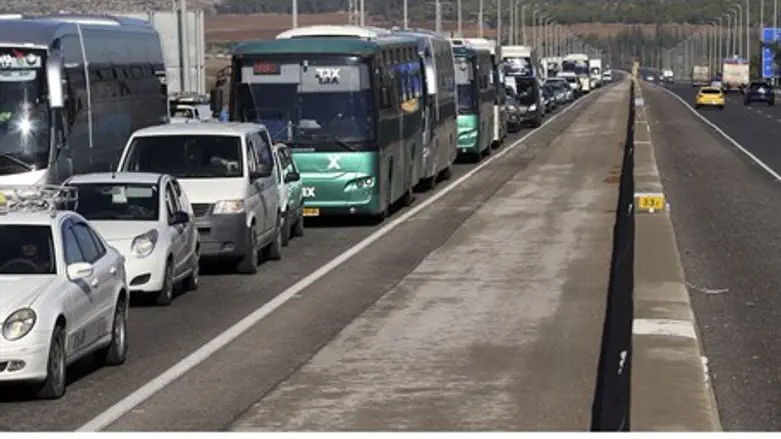
The IDF has decided in recent days that the emergency road that connects the Hizme-Adam route, north of Jerusalem, with the community of Adam, will be opened for traffic, but only when there are heavy traffic jams on the Hizme-Adam route.
The route was closed to traffic last week after leftist groups complained that it had been paved on privately owned land.
Representatives from the military and the Binyamin Regional Council discussed the opening of the road Sunday and reached the decision that the concrete blocks currently blocking the emergency road will be removed and the road will be reopened for traffic – but that this will only happen when and if approved by the Regiment Commander, in coordination with the Division HQ and with the army's assistance. The road will be closed the rest of the time.
In addition, the Council will set up a camera that will make it possible to view the condition of traffic on the Hizme-Adam road throughout the day.
In an interview with Arutz Sheva, Binyamin Regional Council Head Avi Roeh said that the Adam-Hizme road is not only plagued by traffic jams, but also constitutes a security hazard.
“We have warned that this is a security and safety hazard,” he said. “A policeman was stabbed at the Adam Junction, and the terrorist has not been caught to this day. There was also a case of threats with a weapon against passengers who were stuck in a traffic jam in the evening hours, and therefore the Council announced that unless a solution is found, and if the Civil Administration fails to provide a solution for the need, we will take responsibility and connect to the Adam community's security road in order to extricate the people who are stuck in this jam in the afternoon hours.”
Roeh vowed to make it possible for residents of Adam “and others” to circumvent the jam, “which is mostly the result of the Arab population's traffic, waiting to turn west toward Kalandiya. When the junction is not free, they stop and block eastward traffic toward the Binyamin communities.”
The permanent solution for the traffic jam is an 80-million shekel interchange that has already been budgeted, Roeh noted, but the emergency road can be used until the interchange is constructed, as a temporary measure, even if it does pass through privately owned land.